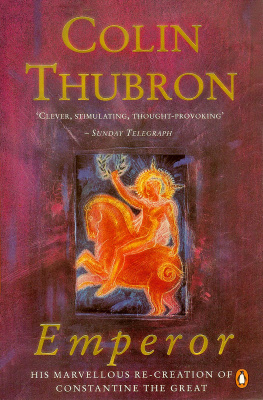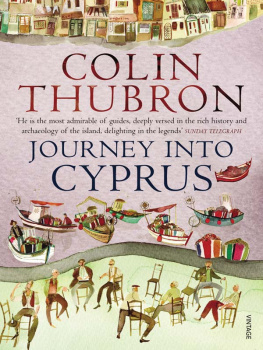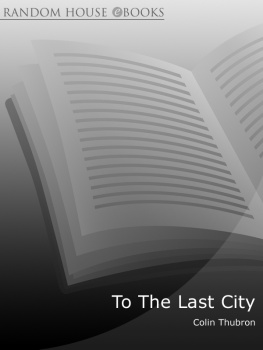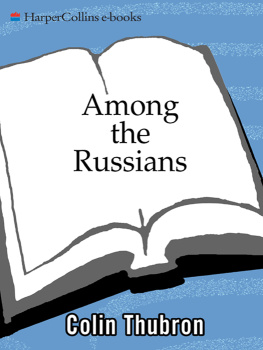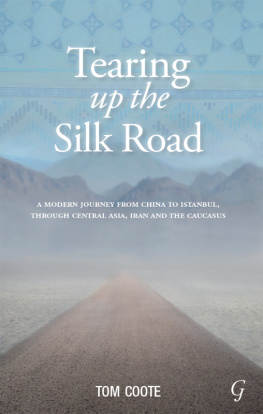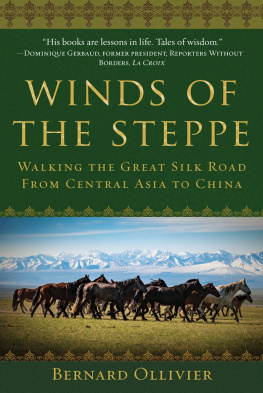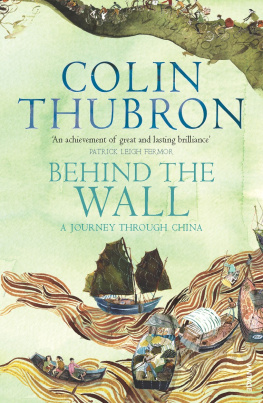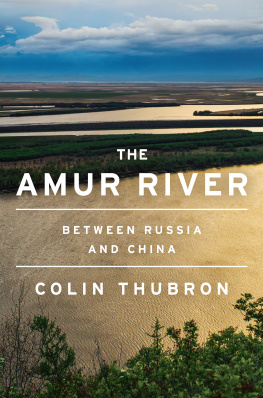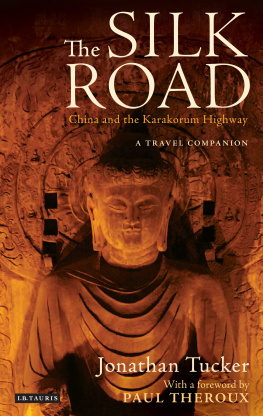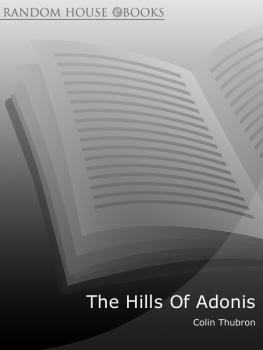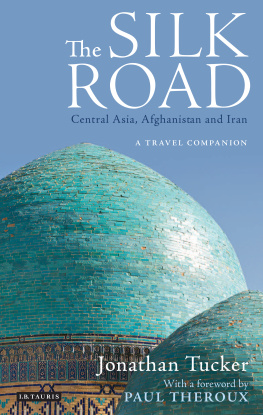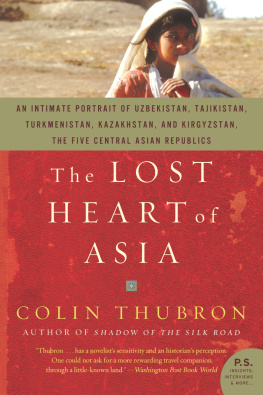Colin Thubron
Emperor
A Novel

Penguin Books
For Monica Mason
The conversion to Christianity of the Emperor Constantine is a watershed in Western history. But this book is not a historical inquiry. Of Constantine too little is known to ascertain so ambiguous a character as I have indicated. Of the Empress Fausta almost nothing is known at all.
Rather I have attempted to explore regions on which history is silent. I have been anxious only not to trespass beyond the bounds of the possible.
Colin Thubron
Melitius, lately Master of Studies to the Augustus Constantine. To Celsus, professor of rhetoric.
Constantinople, 30 May [A.D. 338]
I am sending you these papers by my personal messenger. You I will understand why, after you have read them. What I have to tell you is in strictest secrecy.
A year ago I dined with the Augustus Constantine and several of his close ministers. It was not a formal evening, but the kind of relaxation in which he indulged towards the end of his life. I think the wine must have emboldened me, but since Constantine had several times patted my shoulder almost affectionately, I dared to mention the vision which had converted him to Christianity more than quarter of a century ago. My father, said, had been present.
I must have been mad to mention it. The expression on His Eternitys face changed dramatically. You remember how he could stare at one, tautening his lips? He must also have turned whiter, because the rouge on his cheeks was suddenly very obvious. He said angrily: The matter has been recorded by the Sacred Historian.
As you may imagine, I did not know where to look. 1 stammered an apology. But later I noticed that the Augustus was frowning to himself and kept shifting his position on the couch. Suddenly he leant towards me again, and with an odd perplexity in those intemperate eyes he asked: What did your father say occurred?
Yes, he was asking me what had happened!
I replied: My father never spoke of it, Eternity. (This was true; at the mention of Constantines vision my father was always silent.)
The Augustus checked himself at once, as if remembering who I was (or who he was). He never alluded to the matter again.
It occurred to me then how we learn to evade our past if it is not creditable to us, and to believe our own lies. As for an emperor, the truth is contorted before his eyes. He is surrounded by men who will banish his every mistake into an oblivion of flattery.
Is this what happened to Constantine? I dont know. It only seems to me that for 25 years the Church has been evolving more and more extravagant accounts of his conversion, and that already these are becoming the official truth.
This was the last time I spoke to the Emperor. A month later he was dead.
It was then, while I was still Master of Studies, that I started my investigations. My father Synesius, as you know, was the Emperors private secretary throughout the early years, and after his death I found the cubicula of his house on the Quirinal filled with papers locked in chests. These included the Augustus journal, kept over the months of his invasion of Italy, much of it written in his own hand. I also took advantage of my custodianship of the Imperial Archives to copy down those documents relevant to the period. I transcribed letters gathered by the secret police after the execution of the Empress Fausta; even the letters of her lady companion, a certain Livilla Politta; together with copies of correspondence from the Bishop of Cordoba. (Oh yes, the secret police then were quite as efficient as they are now.)
The result of my findings has not the clarity of state propaganda. But it has, I think, the complexity of truth.
Do you think that posterity would condemn me for bringing these things to the light? Or is the truth better lost for ever? Should we be blind and happy, or honest and disillusioned? An old debate.
I cannot send you everything I have. But Ive copied the documents most relevant to that least explicable happening of our era: the conquest of a Roman emperor by a Galilean prophet. That period seems now as remote as Romulus, I know. But it made us what we are a Christian Empire and will shape the world to come for as long as any of us can predict.
I enjoin on you again the need for secrecy. I await your advice.
Celsus to Melitius.
Constantinople, 2 June
I will not read them. We live in a Christian world now, whatever you or I may feel. What do you think to gain by these disclosures? To spread the truth by gossip? If I did not know you better, I would think you had lost your senses.
You are right when you indicate that the present shapes the past. Now it is not only shaped, but fleshed and firm and credible. It cannot be changed; and I am too old to try, and to die for nothing.
So I return the papers to you, their seals unbroken, and with this advice: Forget.
The Papers
In A.D. 306 Gaius Flavius Constantine, the son of an uneducated but talented Illyrian soldier, succeeded his father as Augustus of Britain and Gaul by the acclamation of his legions in York. During the next few years the Roman Empire was split by civil war, and in the summer of 312 Constantine marched over the Alps against his rival Maxentius in Rome, and laid siege to Verona. He was still a pagan. And he had been married five years to Maxentius own sister, Fausta.
Part One
Verona
I
Geta, Tribune and Master of the Offices, to the Augustus Constantine.
Before Verona, 23 August A.D. 312
N inth report of this month from Rome:
Population continues restless. On 7 August, after thefts by Sicilian troops, there was a three-hour riot among shopkeepers near Trajans Forum; they openly vilified the tyrant Maxentius. There are rumours of another senators estate confiscated, and of his daughters given to army officers. Senators are starting to withhold gifts to the tyrant, in the evident hope that his days are few.
Ill omens increase. It is said that on the Capitoline Hill the statues of the gods are sweating blood. A cat by the Temple of Uranus was heard to speak. Many people attest this.
August 8: two thousand Moorish light cavalry landed in Ostia as reinforcements to Carthaginian auxiliaries; horses very sick, some dead.
May the Augustus live for ever.
II
From the Commonplace Book of Synesius, Master of the Sacred Memory and private secretary to Constantine.
[The diary of the pagan Secretary is incomplete. He appears to have written it for some posterity, but later, because of the unfavourable times, to have suppressed it.]
Verona, 24 August
I would not have believed, a year ago, that I could survive among the siege-works of an army. Yet now I sit at a table in a broken apartment house not two stadia from the walls of Verona, and does this old hand shake? No. Curious what tricks life plays on us. As a young man, when I was quite muscular, I spent my time gossiping like a woman in the corridors of the Sacred Consistory. Now, when I am as my grandchildren tell me all dried up like a dead spider, I find myself campaigning in the field.
Last night, while I watched the fording of the Adige river, I even felt a pang of dare I say it? youthful excitement This disgusts me. Its thirty years since anything, even a woman, turned these withered senses to fire. And now I find myself excited by what? a few thousand men with torches wading across a river to kill people on the other side. When Constantine noticed me among his staff he asked: Do you want to cross over, Secretary?
I suppose I turned pale, poor old Synesius.
Your interests exclude military tactics? he continued, or are you reluctant to die for science, as Pliny did? After that he passed across with his commanders, leaving me on the safer side. I did not know he had even heard of Pliny. I waited by the river with the rest of the secretariat a pitiful bunch we were in the wet dawn watching the baggage wagons cross over and Frankish auxiliaries staking out earthworks to defend the ford. After a while the bodies of men and horses began floating past us, and we went back to the main lines.
Next page
